
Journal Menu
► ▼ Journal Menu-
- Electronics Home
- Aims & Scope
- Editorial Board
- Reviewer Board
- Topical Advisory Panel
- Instructions for Authors
- Special Issues
- Topics
- Sections & Collections
- Article Processing Charge
- Indexing & Archiving
- Editor’s Choice Articles
- Most Cited & Viewed
- Journal Statistics
- Journal History
- Journal Awards
- Society Collaborations
- Conferences
- Editorial Office
Journal Browser
► ▼ Journal BrowserNeed Help?
Announcements
30 June 2021
2020 Impact Factors - Released
The 2020 citation metrics have been officially released in the Journal Citation Reports (JCR)!
We are pleased to announce that 85 MDPI journals are included, of which:
- 10 journals received their first impact factor
- 96% of journals increased their impact factor from 2019
- 32 journals (38%) ranked among the top 25% of journals, in at least one category
| Journal | Impact Factor | Rank | Category |
| Cancers | 6.639 | Q1 | • Oncology |
| Cells | 6.600 | Q2 | • Cell Biology |
| Pharmaceutics | 6.321 | Q1 | • Pharmacology & Pharmacy |
| Antioxidants | 6.313 | Q1 | • Food Science & Technology |
| • Biochemistry & Molecular Biology | |||
| • Chemistry, Medicinal | |||
| Biomedicines | 6.081 | Q1 | • Medicine, Research & Experimental |
| • Pharmacology & Pharmacy | |||
| • Biochemistry & Molecular Biology | |||
| International Journal of Molecular Sciences | 5.924 | Q1 | • Biochemistry & Molecular Biology |
| Q2 | • Chemistry, Multidisciplinary | ||
| Pharmaceuticals | 5.863 | Q1 | • Pharmacology & Pharmacy |
| • Chemistry, Medicinal | |||
| Journal of Fungi | 5.816 | Q1 | • Mycology |
| • Microbiology | |||
| Nutrients | 5.719 | Q1 | • Nutrition & Dietetics |
| Biosensors | 5.519 | Q1 | • Chemistry, Analytical |
| • Instruments & Instrumentation | |||
| Q2 | • Nanoscience & Nanotechnology | ||
| Marine Drugs | 5.118 | Q1 | • Chemistry, Medicinal |
| • Pharmacology & Pharmacy | |||
| Biology | 5.079 | Q1 | • Biology |
| Nanomaterials | 5.076 | Q1 | • Physics, Applied |
| Q2 | • Chemistry, Multidisciplinary | ||
| • Materials Science, Multidisciplinary | |||
| • Nanoscience & Nanotechnology | |||
| Viruses | 5.048 | Q2 | • Virology |
| Journal of Personalized Medicine | 4.945 | Q1 | • Medicine, General & Internal |
| • Health Care Sciences & Services | |||
| Metabolites | 4.932 | Q2 | • Biochemistry & Molecular Biology |
| Biomolecules | 4.879 | Q2 | • Biochemistry & Molecular Biology |
| Remote Sensing | 4.848 | Q1 | • Geosciences, Multidisciplinary |
| Q2 | • Remote Sensing | ||
| • Imaging Science & Photographic Technology | |||
| • Environmental Sciences | |||
| Gels * | 4.702 | Q1 | • Polymer Science |
| Antibiotics | 4.639 | Q2 | • Infectious Diseases |
| • Pharmacology & Pharmacy | |||
| Toxins | 4.546 | Q1 | • Toxicology |
| • Food Science & Technology | |||
| Vaccines | 4.422 | Q2 | • Immunology |
| • Medicine, Research & Experimental | |||
| Molecules | 4.412 | Q2 | • Chemistry, Multidisciplinary |
| • Biochemistry & Molecular Biology | |||
| Foods | 4.350 | Q2 | • Food Science & Technology |
| Polymers | 4.329 | Q1 | • Polymer Science |
| Journal of Clinical Medicine | 4.242 | Q1 | • Medicine, General & Internal |
| Toxics | 4.146 | Q2 | • Toxicology |
| • Environmental Sciences | |||
| Catalysts | 4.146 | Q2 | • Chemistry, Physical |
| Microorganisms | 4.128 | Q2 | • Microbiology |
| Membranes | 4.106 | Q1 | • Polymer Science |
| Q2 | • Engineering, Chemical | ||
| • Materials Science, Multidisciplinary | |||
| • Chemistry, Physical | |||
| Genes | 4.096 | Q2 | • Genetics & Heredity |
| Fermentation * | 3.975 | Q2 | • Biotechnology & Applied Microbiology |
| Journal of Cardiovascular Development and Disease * | 3.948 | Q2 | • Cardiac & Cardiovascular Systems |
| Plants | 3.935 | Q1 | • Plant Sciences |
| Life | 3.817 | Q2 | • Biology |
| Diagnostics | 3.706 | Q2 | • Medicine, General & Internal |
| Current Oncology | 3.677 | Q3 | • Oncology |
| Materials | 3.623 | Q1 | • Metallurgy & Metallurgical Engineering |
| Q2 | • Materials Science, Multidisciplinary | ||
| • Chemistry, Physical | |||
| • Physics, Applied | |||
| • Physics, Condensed Matter | |||
| Sensors | 3.576 | Q1 | • Instruments & Instrumentation |
| Q2 | • Chemistry, Analytical | ||
| • Engineering, Electrical & Electronic | |||
| Pathogens | 3.492 | Q2 | • Microbiology |
| Agronomy | 3.417 | Q1 | • Agronomy |
| • Plant Sciences | |||
| Chemosensors | 3.398 | Q2 | • Instruments & Instrumentation |
| • Chemistry, Analytical | |||
| Q3 | • Electrochemistry | ||
| Land | 3.398 | Q2 | • Environmental Studies |
| Brain Sciences | 3.394 | Q3 | • Neurosciences |
| International Journal of Environmental Research and Public Health | 3.390 | Q1 | • Public, Environmental & Occupational Health (SSCI) |
| Q2 | • Public, Environmental & Occupational Health (SCIE) | ||
| • Environmental Sciences (SCIE) | |||
| Tomography | 3.358 | Q2 | • Radiology, Nuclear Medicine & Medical Imaging |
| Fractal and Fractional * | 3.313 | Q1 | • Mathematics, Interdisciplinary Applications |
| Sustainability | 3.251 | Q2 | • Environmental Sciences (SCIE) |
| • Environmental Studies (SSCI) | |||
| Q3 | • Green & Sustainable Science & Technology (SCIE) | ||
| • Green & Sustainable Science & Technology (SSCI) | |||
| Water | 3.103 | Q2 | • Water Resources |
| • Environmental Sciences | |||
| Journal of Theoretical and Applied Electronic Commerce Research | 3.049 | Q3 | • Business |
| Energies | 3.004 | Q3 | • Energy & Fuels |
| Agriculture | 2.925 | Q1 | • Agronomy |
| ISPRS International Journal of Geo-Information | 2.899 | Q2 | • Geography, Physical |
| • Computer Science, Information Systems | |||
| Q3 | • Remote Sensing | ||
| Micromachines | 2.891 | Q2 | • Instruments & Instrumentation |
| • Physics, Applied | |||
| Q3 | • Chemistry, Analytical | ||
| • Nanoscience & Nanotechnology | |||
| Coatings | 2.881 | Q2 | • Materials Science, Coatings & Films |
| • Physics, Applied | |||
| Q3 | • Materials Science, Multidisciplinary | ||
| Children | 2.863 | Q2 | • Pediatrics |
| Processes | 2.847 | Q3 | • Engineering, Chemical |
| Separations | 2.777 | Q3 | • Chemistry, Analytical |
| Insects | 2.769 | Q1 | • Entomology |
| Animals | 2.752 | Q1 | • Agriculture, Dairy & Animal Science |
| • Veterinary Sciences | |||
| Symmetry | 2.713 | Q2 | • Multidisciplinary Sciences |
| Atmosphere | 2.686 | Q3 | • Meteorology & Atmospheric Sciences |
| • Environmental Sciences | |||
| Applied Sciences | 2.679 | Q2 | • Engineering, Multidisciplinary |
| • Physics, Applied | |||
| Q3 | • Chemistry, Multidisciplinary | ||
| • Materials Science, Multidisciplinary | |||
| Photonics | 2.676 | Q2 | • Optics |
| Buildings * | 2.648 | Q2 | • Construction & Building Technology |
| • Engineering, Civil | |||
| Healthcare | 2.645 | Q2 | • Health Policy & Services (SSCI) |
| Q3 | • Health Care Sciences & Services (SCIE) | ||
| Minerals | 2.644 | Q2 | • Mining & Mineral Processing |
| • Mineralogy | |||
| • Geochemistry & Geophysics | |||
| Forests | 2.634 | Q1 | • Forestry |
| Crystals | 2.589 | Q2 | • Crystallography |
| Q3 | • Materials Science, Multidisciplinary | ||
| Entropy | 2.524 | Q2 | • Physics, Multidisciplinary |
| Diversity | 2.465 | Q2 | • Biodiversity Conservation |
| Q3 | • Ecology | ||
| Journal of Marine Science and Engineering | 2.458 | Q2 | • Oceanography |
| • Engineering, Marine | |||
| • Engineering, Ocean | |||
| Medicina | 2.430 | Q2 | • Medicine, General & Internal |
| Machines * | 2.428 | Q2 | • Engineering, Mechanical |
| Q3 | • Engineering, Electrical & Electronic | ||
| Electronics | 2.397 | Q3 | • Engineering, Electrical & Electronic |
| • Computer Science, Information Systems | |||
| • Physics, Applied | |||
| Fishes * | 2.385 | Q2 | • Fisheries |
| • Marine & Freshwater Biology | |||
| Metals | 2.351 | Q2 | • Metallurgy & Metallurgical Engineering |
| Q3 | • Materials Science, Multidisciplinary | ||
| Horticulturae * | 2.331 | Q1 | • Horticulture |
| Veterinary Sciences * | 2.304 | Q1 | • Veterinary Sciences |
| Universe | 2.278 | Q3 | • Physics, Particles & Fields |
| • Astronomy & Astrophysics | |||
| Mathematics | 2.258 | Q1 | • Mathematics |
| Magnetochemistry | 2.193 | Q3 | • Chemistry, Inorganic & Nuclear |
| • Chemistry, Physical | |||
| • Materials Science, Multidisciplinary | |||
| Current Issues in Molecular Biology | 2.081 | Q4 | • Biochemistry & Molecular Biology |
| Actuators | 1.994 | Q3 | • Instruments & Instrumentation |
| • Engineering, Mechanical | |||
| Aerospace * | 1.659 | Q2 | • Engineering, Aerospace |
* Journals given their first Impact Factor in 2021
Source: 2020 Journal Impact Factors, Journal Citation Reports ® (Clarivate, 2021)
21 June 2021
Meet Us at the China Instrument and Control Society Annual Meeting, Shanghai, China, 27–29 August 2021

MDPI will be attending the China Instrument and Control Society Annual Meeting, which is to be held in Shanghai, China, on 27–29 August 2021. The conference invites experts and students who are engaged in the study of instrumentation to participate in an in-depth discussion on the basic research direction, technological innovation, and industrial path of the instrumentation discipline.
The following MDPI journals will be represented at the meeting:
If you are attending this conference, please feel free to stop by our booth: C-01. Our delegates are looking forward to meeting you in person and answering any questions you may have. For more information about the conference, please visit: http://meeting.cis.org.cn/.
21 June 2021
Electronics Receives Updated CiteScore of 2.7

We are pleased to report that the CiteScore of Electronics has increased to 2.7 (from 1.9). For full details of the current CiteScore release, please refer to the journal’s Source profile (https://www.scopus.com/sourceid/21100829272).
18 June 2021
Electronics Special Issue “Recent Advances in Microelectronics Devices and Integrated Circuit” Is Open for Submission Now!

This Special Issue is edited by Dr. Teo Tee Hui and Prof. Dr. I-Chyn Wey. This Special Issue focuses on novel methodological developments in the field of advanced microelectronics and the design of the related integrated circuits.
Potential topics in computationally intelligent devices areas include, but are not limited to, the following:
- artificial intelligence technologies in direct memory;
- deep-learning-driven procession unit;
- display/motor driver;
- sensor interface;
- parallel computing;
- cryptography in quantum computing devices and circuits;
- novel design directions and improve devices, circuits, system performance, as well as processes;
- limitations of applying artificial intelligence to certain problems and specific domains.
Moreover, this SI is cooperated by the IEEE 14th International Symposium on Embedded Multicore/Manycore Systems-on-Chip: MCSoC 2021, it will be held in Singapore, 20–23 December 2021. ( https://www.mcsoc-forum.org/ )
Selected papers from MCSoC 2021 and all the external contributions in this field are welcome in this Special Issue.
Important Dates for Conference:
Abstract submission: 25 June 2021
Full paper submission: 25 June 2021 (extended)
Acceptance notification: 30 July 2021
Camera-ready paper: 10 August 2021
Conference: 20–23 December 2021
Important Dates for Special Issue:
Submission deadline: 31 May 2022
Conference logo:
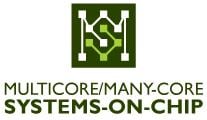

For more information, please refer to the Special Issue:
https://www.mdpi.com/journal/electronics/special_issues/microelectron_devices_integr_circuits
Conference website .https://www.mcsoc-forum.org/
Submission Guidelines
Submission link: https://susy.mdpi.com/user/manuscripts/upload/62ecda0a807a292a8434b0c463ceaff7/1
Instructions for authors:
https://www.mdpi.com/journal/electronics/instructions
A template Word file:
https://www.mdpi.com/files/word-templates/electronics-template.dot
A template LaTeX file:
https://www.mdpi.com/authors/latex.
If you have any questions, please contact joy.li @mdpi.com; electronics@mdpi.com
10 June 2021
Recruiting Editorial Board Members for the New Sections “Electronic Materials” and “Electronic Multimedia” of Electronics
Electronics has just launched two new Sections: “Electronic Materials” and “Electronic Multimedia”. If you are an active researcher in the field and are passionate about participating in cutting-edge research publications, please do not hesitate to contact us about joining the board and contributing to the Sections.
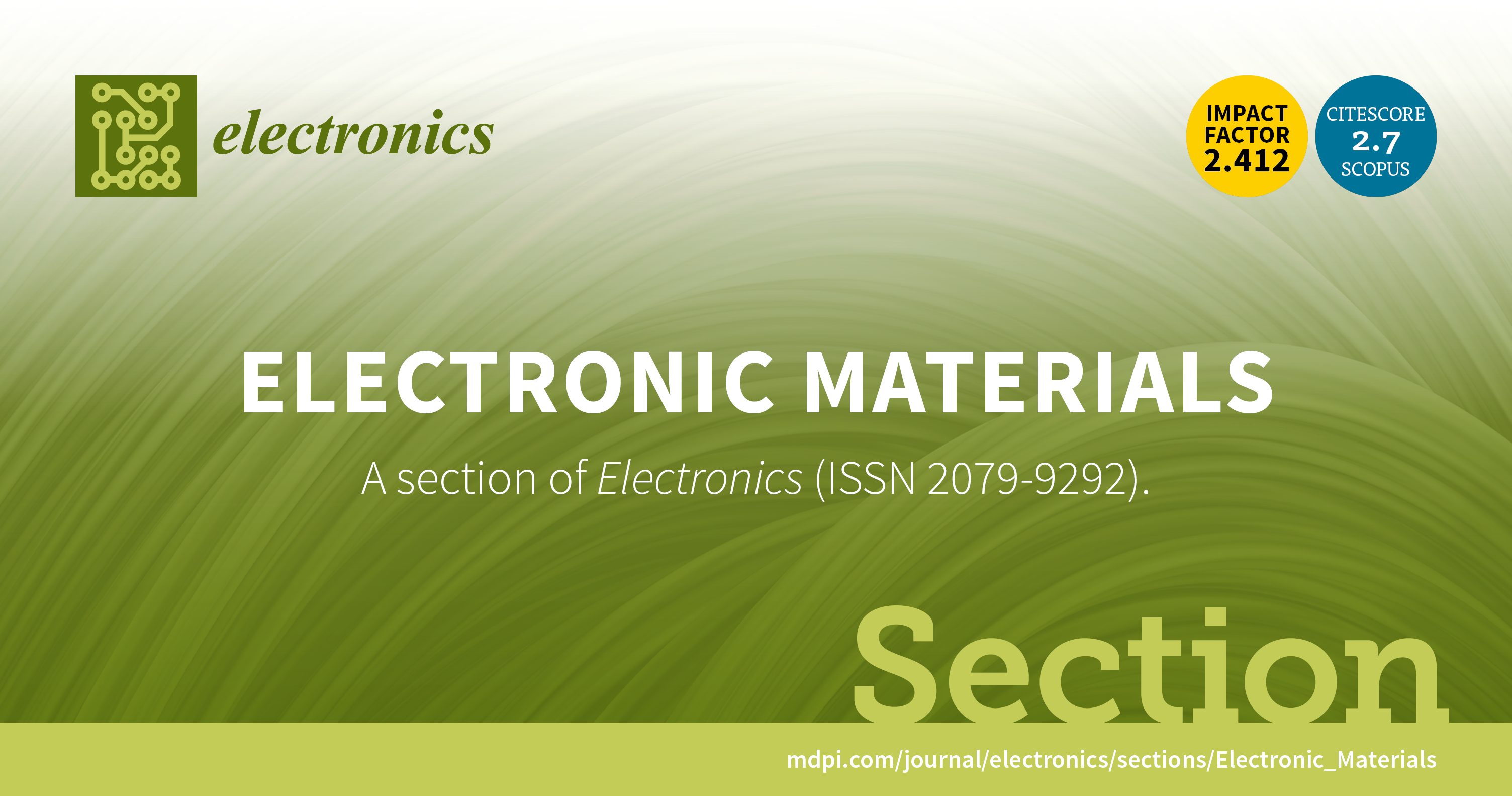
The Section “Electronic Materials” (https://www.mdpi.com/journal/electronics/sections/Electronic_Materials) reports on the science, technology, and applications of electronic materials that are used in electrical industries, electronics and microelectronics, as well as the substances used in the construction of integrated circuits, circuit boards, packaging materials, communication cables, optical fibers, displays, and various controlling and monitoring devices.
The main topics of this Section include but are not limited to the following:
- Electronic materials science and technology;
- Energy storage and conversion materials;
- Nanoscale science and technology;
- Organic materials and thin-film technology;
- Oxide semiconductors and dielectrics;
- Wide bandgap semiconductors.
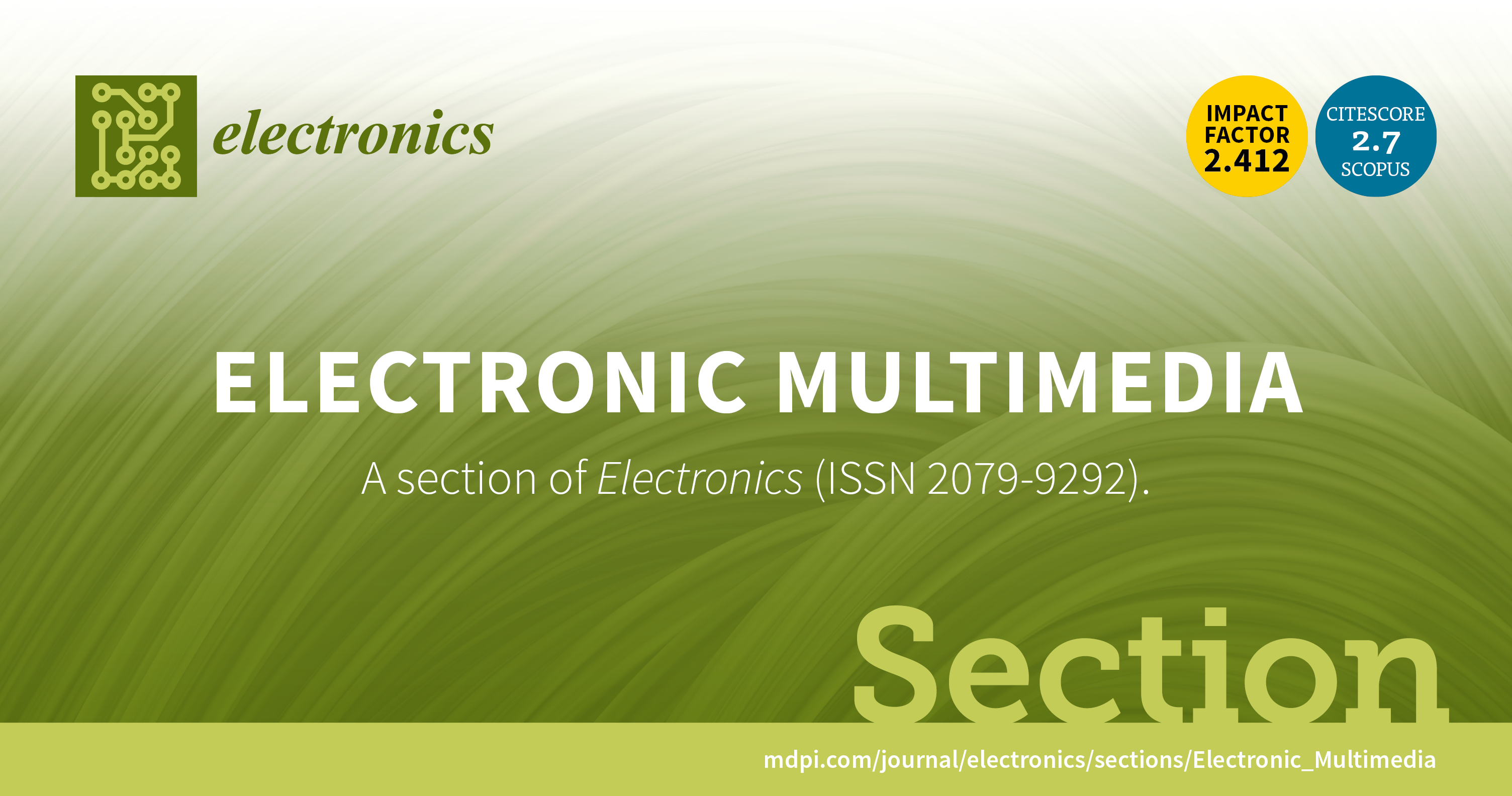
The Section “Electronic Multimedia” (https://www.mdpi.com/journal/electronics/sections/Electronic_Multimedia) reports on electronic multimedia technology, tools, and applications of electronic multimedia, including but not limited to circuits, networking, signal processing, systems, software, and system integration.
The main topics of this Section include but are not limited to the following:
- Electronic multimedia systems;
- Electronic multimedia communications;
- Electronic multimedia processing;
- Electronic multimedia applications.
If you have any questions, please contact electronics@mdpi.com.
28 April 2021
Book Builder—Compile a Customized E-Book from Your Favorite MDPI Open Access Content
MDPI Books recently released Book Builder, a new online tool to conveniently arrange, design and produce an eBook from any content published in MDPI journals. Book Builder offers two functions: on the one hand (1) Selections, available to every registered user of MDPI; on the other hand (2) Special Issue Reprints, which can be used exclusively by Guest Editors of Special Issues.
Selections
In just a matter of a few clicks, all users are now able to assemble books from MDPI articles and receive instantaneous feedback in the form of a fully produced and compiled book (PDF), which can be downloaded or ordered as print copy. Selections can include any paper published with MDPI, picking and combining content from different journals and special issues.
This way, the user may for example choose to compile an ebook focusing around a particular topic, or assemble articles from a group of others.
We invite you to make yourself familiar with the new tool! The Book Builder can be found here: https://www.mdpi.com/books/book_builder.
Special Issue Reprints
The Book Builder allows Guest Editors of MDPI journals to create a reprint from a successfully completed Special Issue or Topical Collection in book format. If you are a Guest Editor for an MDPI journal, you can use the new tool to create an PDF document which includes all articles published in the Special Issue as well as a book cover and table of contents.
For Special Issues containing a minimum of 5 articles, the Guest Editor can request its publication on the MDPI Book platform. Published reprints are assigned an ISBN and DOI.
In addition to the PDF copy of the Reprint Book, as a token of our gratitude, MDPI offers every Guest Editor one (1) complimentary print copy (via print-on-demand). All contributors benefit from a discount on orders of any additional print copies, to share with colleagues or libraries or others.
In line with our organization's values, MDPI Books publishes all content in open access, promoting the exchange of ideas and knowledge in a globalized world. MDPI Books encompasses all the benefits of open access—high availability and visibility, as well as wide and rapid dissemination. MDPI Books are distributed under the terms and conditions of the Creative Commons Attribution License, meaning as an author you retain the copyright for your work. In addition, with MDPI Books you can complement the digital version of your work with a high-quality printed counterpart.
If you are interested in editing a book volume or series, or have a monograph manuscript to be considered for publication, please submit your proposal online and look at our Information for Authors.
Contact: Laura Wagner, MDPI Books Manager (email)
26 April 2021
Electronics | 2021 Young Investigator Award—Winner Announced
Dear Colleagues,
We are pleased to announce that the winner of the Electronics 2021 Young Investigator Award is Dr. Amir H. Gandomi.
Dr. Amir H. Gandomi is a Professor of Data Science at the Faculty of Engineering & Information Technology, University of Technology Sydney, Australia. Dr. Gandomi’s research interests are in artificial intelligence, big data analytics, machine learning, genetic programming, evolutionary computation, and their applications in smarts cities and systems. Dr. Gandomi received his PhD in 2015 and has an outstanding publication record, comprising more than 200 publications in peer-reviewed international journals, which have been collectively cited more than 20,000 times (Hirsch index of 66). He is clearly a rising star in the field of Computational Intelligence and Data Analytics. Despite his young age, Dr. Gandomi has been the recipient of several academic prizes, including the Discovery Early Career Researcher Award for AUD 400,000, the BEACON distinguished research fellowship for USD 120,000, and the Highly Cited Researcher Award for four consecutive years, 2017 to 2020. This is an outstanding achievement in today’s competitive environment. Please join us in congratulating Dr. Gandomi for his outstanding achievements.
As the awardee, Dr. Amir H. Gandomi will receive an honorarium of CHF 1800, a certificate and an offer to publish a paper free of charge without a fixed deadline in Electronics after peer review.
We would like to thank all the nominators from various fields of study for their participation and all the Award Committee Members for their evaluation of the abundant excellent nominations.
Electronics 2021 Young Investigator Award Evaluation Committee
23 April 2021
Meet Us at 2021 IEEE 4th International Conference on Electronics Technology (ICET), Chengdu, China, 7–10 May 2021

ICET is the premier conference held yearly in Chengdu, China. Its primary aim is to offer senior and young scientists, from academic communities, electronic industries and from all over the world, the opportunity to exchange research ideas and share new knowledge, development and experiences on topics related to their experimental and theoretical work in the very widespread field of electronics and micro/nanoelectronics technology and electronic packaging in a convenient and multicultural atmosphere.
The following MDPI journals will be represented:
If you are attending this conference, please feel free to stop by our booth. Our delegates look forward to meeting you in person to answer any questions you may have.
For more information about the conference, please visit: http://icet.net/.
16 April 2021
Electronics | 3rd Webinar on Low Dimensional Materials for Optoelectronic Applications

This webinar will address issues related to the latest achievements in Low Dimensional Materials for Optoelectronic Applications attributed to our invited speakers. Audience members will have the opportunity to expand their knowledge and engage in a Q&A with the speakers.
Date: 26 April 2021
Time: 10 a.m. (CEST)
Webinar ID: 856 9742 8566
Register for free here: https://electronics-3.sciforum.net/#webinar_registration
Chair:
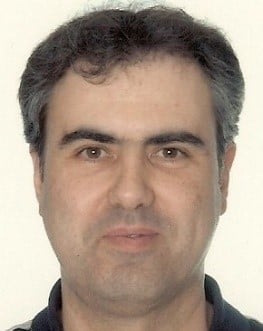
Prof. Dr. Elias Stathatos
Section Editor-in-Chief of “Microelectronics and Optoelectronics” in Electronics
Interests: nanostructured semiconductors; third-generation photovoltaics, including perovskite and dye-sensitized solar cells; organic electronics
Speakers:

Dr. Sanshui Xiao
EBM of Section “Microelectronics and Optoelectronics” of Electronics
Presentation Title: Integrated 2D-Material-Based Optoelectronic Devices
Sanshui Xiao obtained his PhD degree at Zhejiang University in 2004, and he is now an Associate Professor at the Technical University of Denmark. His current research interests mainly focus on the exploration of fundamental physics of light–matter interactions and the development of 2D-material-based optoelectronic devices. He has published more than 120 journal papers with a total citation of 4000 and an h-index of 33 (Google scholar). He has co-organized several sessions at SPIE, PIERS, AME, and EMN conferences and obtained the European Optics Prize from the European Optical Society in 2008. He is a senior member of OSA and SPIE, and also serves as the Topical Editor for Applied Optics.
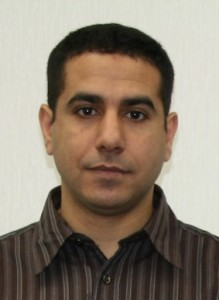
Prof. Dr. Yahya M. Meziani
EBM of Section “Microelectronics and Optoelectronics” of Electronics
Presentation Title: 2D-Material-Based Devices for Terahertz Technology
Dr. Yahya Meziani is currently working as an Associate Professor at the Department of Applied Physics, Salamanca University. He has previously worked as a researcher for Tohoku University, Japan, and for Montpellier 2 University, France. Dr. Meziani has been conducting research on the Quantum Hall effect phenomenon and its application for the conservation of the Ohm unit. His research focuses on the development of new electronic devices that can emit and/or detect terahertz radiation at room temperature. He is author and co-author of more than 90 scientific publications. He has a h-index of 19 according to Web of Science.
For any questions about the webinar, please send an email to electronics.webinar@mdpi.com.
15 April 2021
MDPI Celebrates Company Milestone With 25th Anniversary Page
"We exist to help scientists achieve their own objectives"

In June of this year, MDPI will celebrate the 25th anniversary of its foundation. To mark this significant milestone, we have created a 25th Anniversary page on our website that evokes the development of our company over the past quarter-century.
MDPI has been a pioneer of Open Access publishing ever since the concept was first created.
In a wide-ranging interview, our CEO Delia Mihaila reflects on the company’s 25th anniversary and its contribution to the world of scientific publishing.
Delia considers how MDPI has evolved since starting life in 1996 as a visionary ‘project’ run out of an apartment in Basel, Switzerland, by Dr. Shu-Kun Lin. A chemist who was passionate about the long-term preservation of rare chemical sample, Dr. Lin was determined to help scholars publish their findings as quickly as possible and make their research results available to as wide a readership as possible worldwide. That determination remains unchanged 25 years later.
Today, MDPI is an international organization with over 4,000 employees based on three continents and in ten countries, and ranks among the world's top four academic publishers.
MDPI's mission is to accelerate access to new scientific research, delivering insight faster for researchers worldwide. Read more here about the company's remarkable success story and what the Open Access publishing model can offer the global scientific community.



